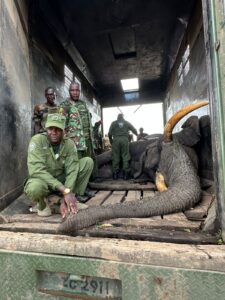 As we enter into Mara Elephant Project’s 10th year of operation, we are more equipped to handle the increase in habitat destruction activities and bushmeat poaching we’re seeing in the Greater Mara Ecosystem (GME). We hope that the tourist industry is revived this year, and we are busy greeting visitors on MEP’s campus during high season. In the meantime, MEP continues to focus on reducing poaching and deterring illegal habitat destruction activities in the Mara and on March 29 we celebrated when the full MEP frontline staff were all able to receive their first dose of the AstraZeneca vaccination against the COVID-19 virus (pictured above: a ranger receiving his shot). Our entire complement of rangers and staff worked over this past year without disruption, and we are relieved that we can continue to do so with the added protection of the vaccine. MEP’s staff all had their shots in Narok, and everyone experienced minimal side effects. We are extremely grateful to the Kenyan government and all of the medical workers and scientists who made this possible.
As we enter into Mara Elephant Project’s 10th year of operation, we are more equipped to handle the increase in habitat destruction activities and bushmeat poaching we’re seeing in the Greater Mara Ecosystem (GME). We hope that the tourist industry is revived this year, and we are busy greeting visitors on MEP’s campus during high season. In the meantime, MEP continues to focus on reducing poaching and deterring illegal habitat destruction activities in the Mara and on March 29 we celebrated when the full MEP frontline staff were all able to receive their first dose of the AstraZeneca vaccination against the COVID-19 virus (pictured above: a ranger receiving his shot). Our entire complement of rangers and staff worked over this past year without disruption, and we are relieved that we can continue to do so with the added protection of the vaccine. MEP’s staff all had their shots in Narok, and everyone experienced minimal side effects. We are extremely grateful to the Kenyan government and all of the medical workers and scientists who made this possible.

The MEP team pictured outside the clinic after receiving their first shot.
 On March 16, MEP was sad to announce the passing of conservation giant Colin Church (pictured left). Up until his death, Colin was the chairman of MEP and a founding member of the organization. Colin was a pillar, mentor, and gentleman who did so much for so many. Colin’s passion for wildlife conservation came to the fore in the Aberdare National Park when he led the Rhino Ark with the enormous task of fencing and protecting the Water Tower and the endangered species living there. Colin brought new skills to the conservation space from his business career in public relations. Colin’s contributions to conservation, the environment, and the community in Kenya, was recognized when Her Majesty the Queen honored him with the Most Excellent Order of the British Empire (OBE) in 2017. Colin’s leadership at MEP championed the next generation of conservationists the rangers who work on the front line. Colin guided our board, mentored management staff, and pride glowed on the faces of MEP rangers when Colin would visit and congratulate them for their work. To work with, be mentored by, and learn from Colin’s gentle, decent, and steadfast resolve has been an honor. Alongside being a national treasure Colin was the loving leader of the “Kanisa Clan”. From every ranger and staff member at MEP we send our condolences to Nicole, Marcus, Tanya, Julie, Antonia, and his many grandchildren and relatives.
On March 16, MEP was sad to announce the passing of conservation giant Colin Church (pictured left). Up until his death, Colin was the chairman of MEP and a founding member of the organization. Colin was a pillar, mentor, and gentleman who did so much for so many. Colin’s passion for wildlife conservation came to the fore in the Aberdare National Park when he led the Rhino Ark with the enormous task of fencing and protecting the Water Tower and the endangered species living there. Colin brought new skills to the conservation space from his business career in public relations. Colin’s contributions to conservation, the environment, and the community in Kenya, was recognized when Her Majesty the Queen honored him with the Most Excellent Order of the British Empire (OBE) in 2017. Colin’s leadership at MEP championed the next generation of conservationists the rangers who work on the front line. Colin guided our board, mentored management staff, and pride glowed on the faces of MEP rangers when Colin would visit and congratulate them for their work. To work with, be mentored by, and learn from Colin’s gentle, decent, and steadfast resolve has been an honor. Alongside being a national treasure Colin was the loving leader of the “Kanisa Clan”. From every ranger and staff member at MEP we send our condolences to Nicole, Marcus, Tanya, Julie, Antonia, and his many grandchildren and relatives.
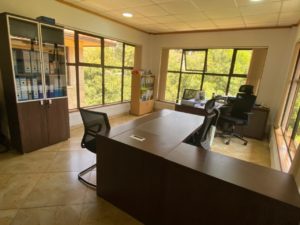 In March, MEP moved into a new office in Nairobi at Watermark Office Park (pictured right). MEP’s Nairobi office is the main location where CFO Stanley Misoka works, and other MEP senior staff host meetings while in the city. We were able to secure this location for a very fair monthly rate, and Stanley is really enjoying the gorgeous view and lots of natural light. Having a presence in Nairobi is critical to the work our organization does in the Maasai Mara, and we are happy to now have a home at 2nd Floor Spring Court, Watermark Office Park, Ndege Road in Karen.
In March, MEP moved into a new office in Nairobi at Watermark Office Park (pictured right). MEP’s Nairobi office is the main location where CFO Stanley Misoka works, and other MEP senior staff host meetings while in the city. We were able to secure this location for a very fair monthly rate, and Stanley is really enjoying the gorgeous view and lots of natural light. Having a presence in Nairobi is critical to the work our organization does in the Maasai Mara, and we are happy to now have a home at 2nd Floor Spring Court, Watermark Office Park, Ndege Road in Karen.
MEP’s 501(c)3 in the U.S. the Sidekick Foundation, Inc. announced new Executive Director Trey Fehsenfeld in March. Trey is taking over for Brian Kearney-Grieve who played an intracule part in MEP’s growth as an organization and success over the last several years. Brian not only served as a trustee on MEP’s Board of Directors, but also worked closely with MEP’s senior staff to implement processes and increase the level of professionalism for our organization. It has been a pleasure working alongside Brian, and MEP looks forward to doing the same with Trey who has been a long-time liaison between Sidekick and MEP.
On March 12, MEP, KWS and Olderkesi rangers successfully arrested three suspects that were in possession of a live (thankfully) pangolin. Pangolins are some of the most trafficked animals in the world. They are very shy creatures, and their skin is made of scales that many people in Asia believe to have healing properties. There are some theories that the COVID-19 strain actually came from pangolin meat in Wuhan’s wet markets. We are happy to say that this little guy was still alive and after being taken care of overnight, he was released into the custody of The Pangolin Project and given a ride on MEP’s leased helicopter be a live exhibit at the Narok Law Courts. He was then successfully reintroduced into the wild.
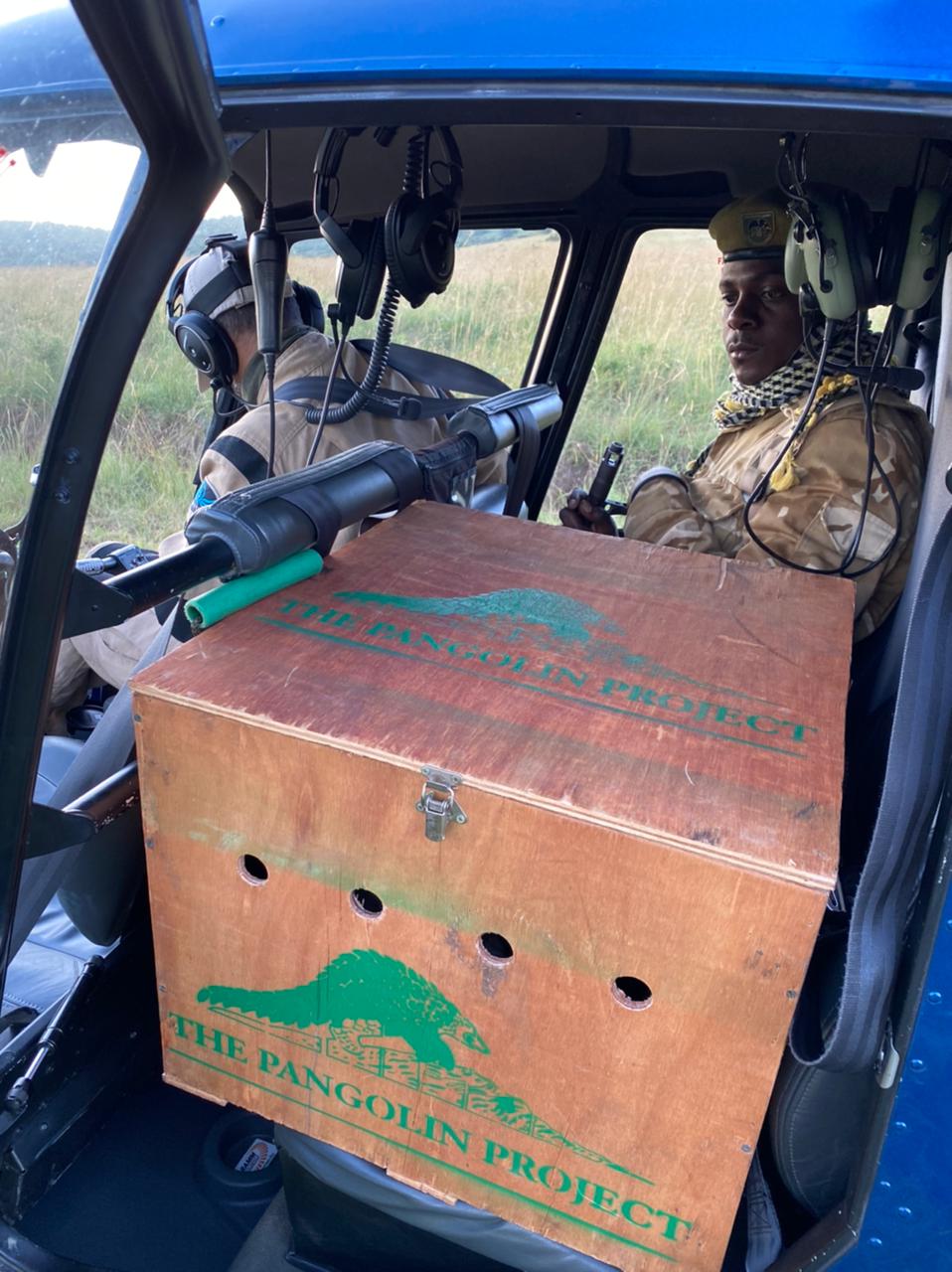
The pangolin receiving a ride on MEP’s leased helicopter.
The leased helicopter was also used in three collaring exercises in the first quarter alongside Kenya Wildlife Service (KWS). The first, was in January when collared elephant Chelsea needed medical intervention and a new collar. In March, KWS and MEP collared two female elephants, Clara along the Sand River and Josephine in Shompole.
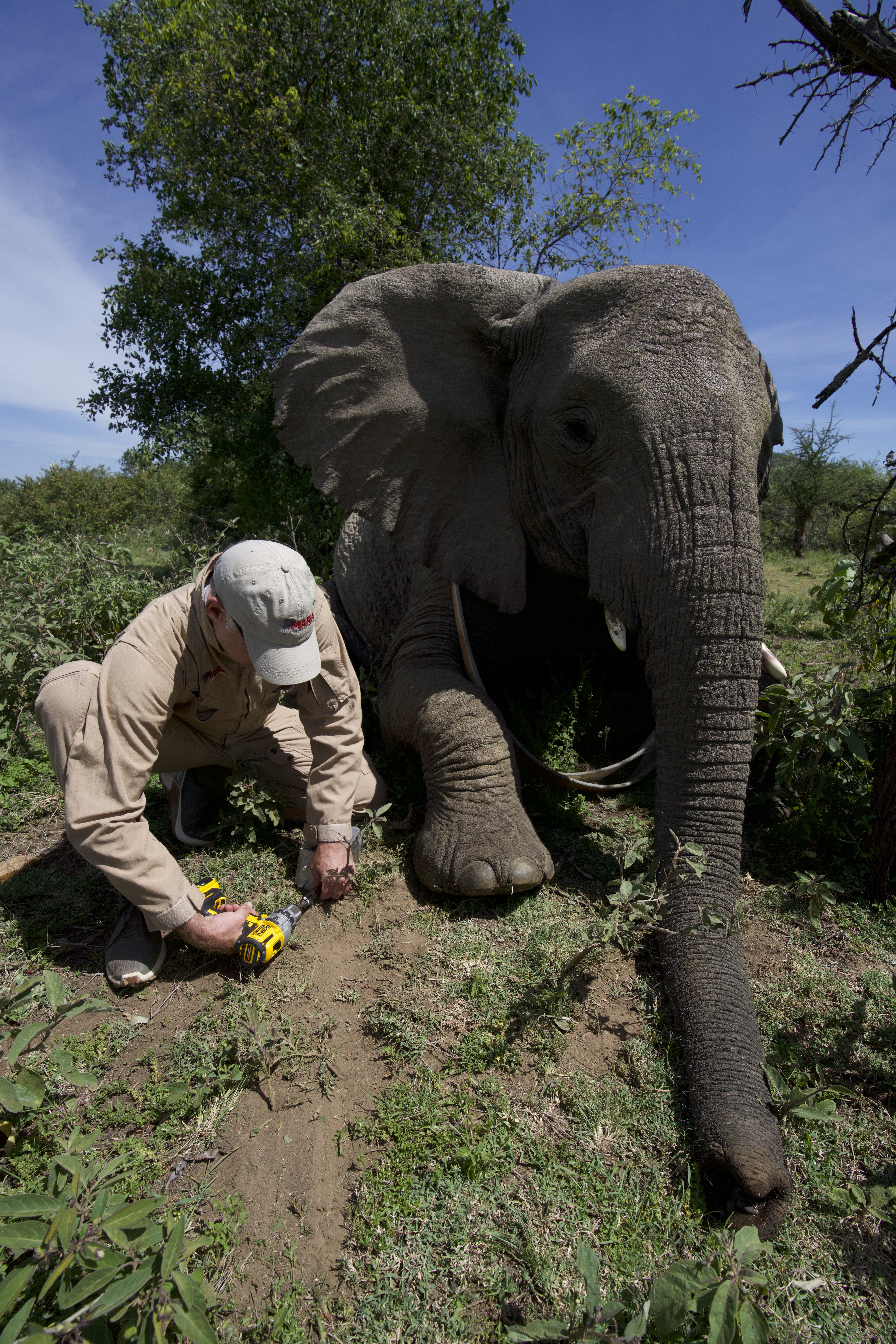
One of the two collaring operations in March putting hardware on a female elephant candidate.
MEP also took the last week of January to aerially monitor Fred, Ivy, Fitz, David, Kegol, Kiambi, Lempiris, Chelsea, Matali, Hannibal, Napoleon and two herds in Olarro Conservancy and the Southern Loita area.
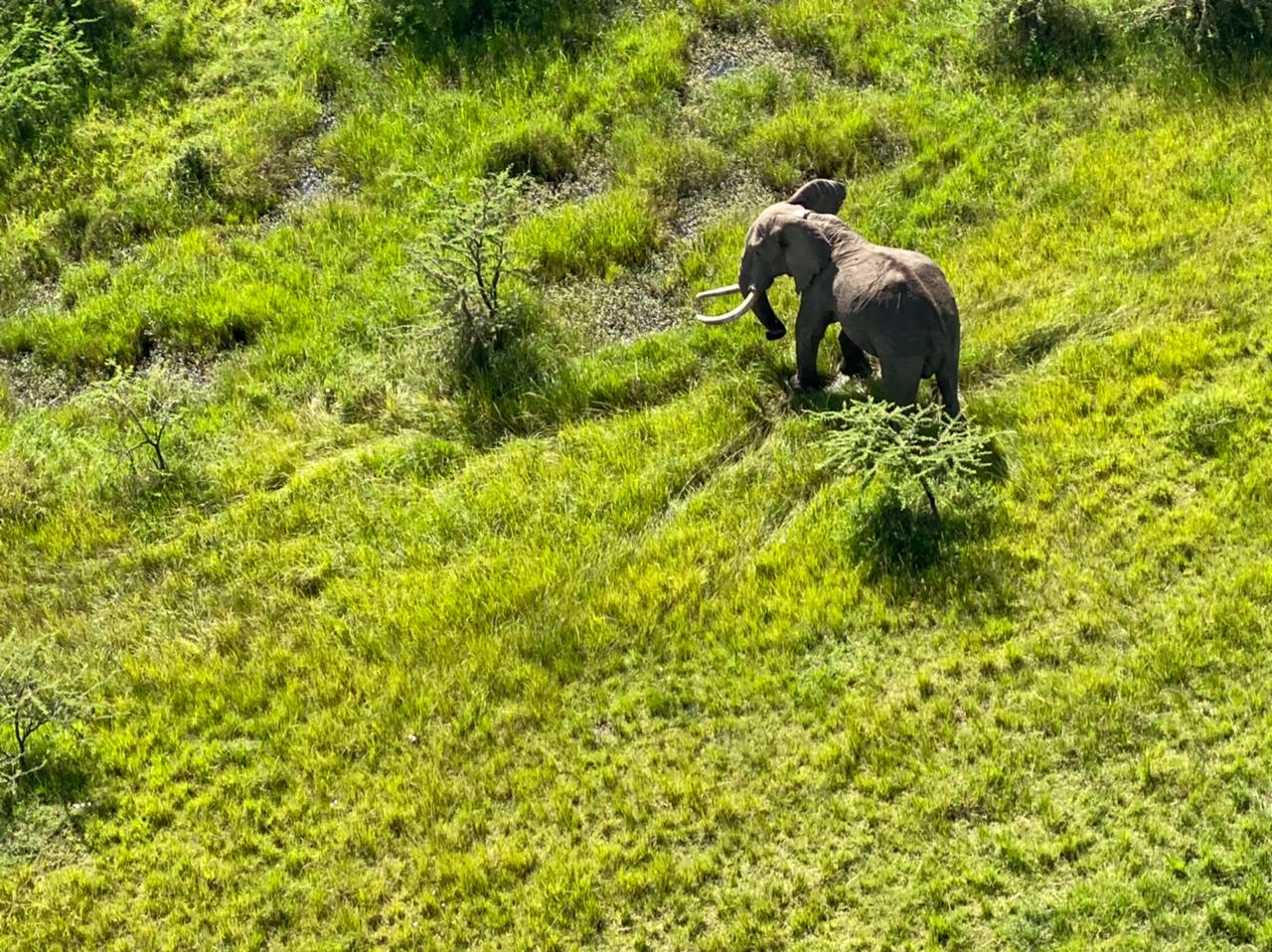
Collared elephant Kegol seen from the air while on a monitoring flight.
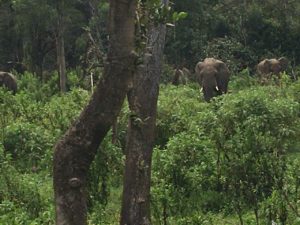 The leased helicopter was also used to help MEP rangers on the ground respond to conflict. In January, MEP had to deploy the helicopter to move Fitz (pictured left) and his herd back into Dupoto Forest from the western edge of the forest which is experiencing a huge amount of destruction. Then, on February 5, MEP’s rangers were called into Ngoswani Center when a group of bulls had gotten stuck inside a fence. After the ranger’s efforts on the ground weren’t moving the bulls and tensions were rising, the leased MEP helicopter was called in to quickly move the bulls to safety. The helicopter successfully moved the bulls out of the fenced area.
The leased helicopter was also used to help MEP rangers on the ground respond to conflict. In January, MEP had to deploy the helicopter to move Fitz (pictured left) and his herd back into Dupoto Forest from the western edge of the forest which is experiencing a huge amount of destruction. Then, on February 5, MEP’s rangers were called into Ngoswani Center when a group of bulls had gotten stuck inside a fence. After the ranger’s efforts on the ground weren’t moving the bulls and tensions were rising, the leased MEP helicopter was called in to quickly move the bulls to safety. The helicopter successfully moved the bulls out of the fenced area.


